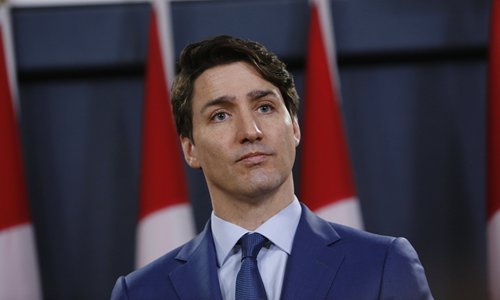Canada’s ‘microphone diplomacy’ will be to no avail
Source:Global Times Published: 2020/6/28 23:28:45

Justin Trudeau Photo: VCG
Ties between China and Canada have been strained for some time now—particularly with the Huawei CFO Meng Wanzhou's case. And, of course, with the prosecution of two Canadian nationals charged with being spies in China. Worse still, Canadian media has completely sensationalized these matters.
It has reached the point where the Chinese Embassy in Ottawa, Canada had to issue a statement on Saturday, urging the latter to stop pressuring China through "microphone diplomacy."
Microphone diplomacy means resorting to finger-pointing and name-calling via publicity, often the media, rashly, without rational conversations. In Canada's case, it also means siding with the US in a high-profile manner. As a result, this has exacerbated antagonisms between Beijing and Ottawa.
Certain key incidents should be noticed in Canada's microphone diplomacy: Ottawa knew the US was planning to arrest Meng and participated in the operation. Ottawa carried out the arrest at Vancouver International Airport at the end of 2018 on fraud charges. In the 2019 Canadian federal election, the Liberal Party, led by Prime Minister Justin Trudeau, and its opposition the Conservative Party, both displayed their tough stance on China.
Meng's case triggered strong opposition in Canadian political circles with 19 former Canadian politicians and diplomats writing a letter to Trudeau claiming that Canada has the legal right to free Meng and redefine the country's strategic approach to China. But Trudeau rejected these calls.
Canada is technically not a country with full sovereignty. Its head of state is Queen Elizabeth II. Canada was founded in 1867. Yet in over 100 years before that, it was swaying among three choices - being a British colony, being annexed by the US, and being a vassal of the US. Due to such historic experiences, Canada lacks an independent political mindset to this day.
Canada believes that is has achieved independent diplomacy, but it only really follows the House of Windsor or Washington.
Moreover, Canada has not enough professional expertise in managing its foreign policies — especially in diplomacy with China.
It can be argued that Canada's microphone diplomacy is a typical manifestation of US fueled McCarthyism. If the country keeps avoiding contemplating what went wrong with its ties with China, then such diplomatic McCarthyism will likely continue until it encounters a major setback.
Be it Trudeau's decision over Meng, or Canada's moves to follow Washington on unfriendly policies toward China, the fundamental reason for all this is about the elections and pandering to anti-China forces in Canada. Since Trudeau will hardly uphold righteous reasons to release Meng, he would only express concern verbally over the two arrested Canadian nationals.
There is no conflict between China and Canada over the two sides' core interests. Yet given the economic and trade between them, differences in people's beliefs and Canada's own calculations over what to do as a middle power, China has not factored into Ottawa's thinking as a central player. That being the case, continuous diplomatic tensions will occur.
However, if the Trudeau administration is able to rid itself of cold-war mind-set and return to clear-headed diplomacy, then Canada certainly will find better bilateral relations with China. This will boost the country's economic diversification and capability to withstand risks. Without a doubt, the Chinese market is Canada's new opportunity for maintaining its economic development and growth amid the pandemic.
The article was compiled by Global Times reporter based on an interview with Yao Peng, managing deputy director of the Canadian Studies Center of the Chinese Academy of Social Sciences. opinion@globaltimes.com.cn
Posted in: VIEWPOINT